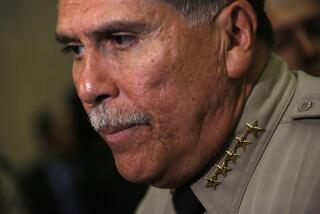Hush-Hush Work on Panel Is an Education
The hours vary, the pay is lousy, the work can be dull, and when people ask what you’ve been up to, you can’t breathe a word.
But you do get a reserved parking place. And, as a member of the Ventura County grand jury, you have a chance to learn about local government and make it better, former grand jury members say.
“I would say it’s extremely interesting,” said Leonard Harris, a retired Simi Valley engineer who served as foreman of the 1988-89 grand jury. “I thought I knew something about county and city government, but I had much to learn.”
Although the grand jury is increasingly being used for criminal cases, its main function under the state Constitution is to be a watchdog on county government. Each year, the grand jury investigates county departments and issues recommendations. For example, Harris said his panel saved the county millions of dollars by recommending improvements in purchasing procedures.
The grand jury, appointed by the Superior Court judges, is part of the judicial branch of government, but it is an independent body, free to look into and comment on anything it wants.
The 1963 grand jury made sure that “The Dictionary of American Slang”--apparently a controversial work at the time--was not available at any library or public school in the county. (It has since infiltrated the county library system’s collection, according to a librarian at the E.P. Foster branch in Ventura.) The same grand jury recommended that the county establish building standards for fallout shelters.
By law, agencies targeted for grand jury criticism or recommendations must respond, but they do not have to follow the advice.
Betty Kane, the county’s manager of jury services, said anyone can apply to be a grand juror, and now is the time. Applications must be returned by Friday.
Applications are available from judges, federal and state lawmakers, county supervisors, city officials, past grand jurors and from Kane’s office.
The Superior Court judges will choose 30 finalists--six from each supervisorial district--and 19 are chosen by lot to serve as the grand jury.
Grand jury members have to spend three or four days a week on their duties, and they make only $20 per day plus mileage. They are sworn to secrecy and cannot tell outsiders anything about their activities.
Few people can afford the time and financial commitment, Kane conceded, and the judges who make the selections are especially interested in receiving more applications from minorities, young people and low-income residents.
Judge Edwin M. Osborne, presiding judge of the Superior Court, said he looks for “someone with common sense, the time to devote to the job and no personal agenda or crusade.”
More to Read
Sign up for Essential California
The most important California stories and recommendations in your inbox every morning.
You may occasionally receive promotional content from the Los Angeles Times.










